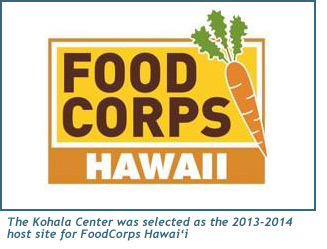 With hunger affecting one out of every five children in the United States, and obesity affecting one out of every six, the need to connect our keiki (children) with healthy food is more urgent than ever before. FoodCorps, a national non-profit program that connects kids to real food and helps them grow up healthy, recently added Hawai‘i to its roster of states it serves, and selected The Kohala Center's Hawai‘i Island School Garden Network (HISGN) program as its host site.
With hunger affecting one out of every five children in the United States, and obesity affecting one out of every six, the need to connect our keiki (children) with healthy food is more urgent than ever before. FoodCorps, a national non-profit program that connects kids to real food and helps them grow up healthy, recently added Hawai‘i to its roster of states it serves, and selected The Kohala Center's Hawai‘i Island School Garden Network (HISGN) program as its host site.
By teaching keiki about what healthy food is and where it comes from; by planting and caring for school gardens; and by bringing high-quality locally grown food into public school cafeterias, FoodCorps aims to increase access to fresh, healthy food for children and their families. Earlier this year, FoodCorps began recruiting members who are passionate about healthy food, farms and children. After a FoodCorps committee screened over 1,000 applications for just eight Hawai‘i positions, eighty-three were sent to Nancy Redfeather, HISGN program director and host site supervisor of FoodCorps Hawai‘i. Ultimately, Hawai‘i school principals made the final selections, and on September 1st eight bright, passionate FoodCorps service members began serving at public and charter school on Hawai‘i Island, O‘ahu, and Moloka‘i. Six of the eight service members chosen for Hawai‘i are from their own communities.
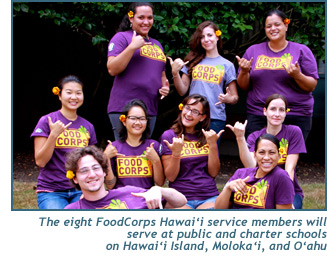 Nancy notes that Hawai‘i is a unique place with a different environment and a different culture. “It can take a year or more to understand Hawai‘i, so when applicants are from the local communities, they can be effective leaders immediately,” she said. “Knowledge of local culture and values, dedication to healthy communities, a sense of kuleana (responsibility) to foster youth, and the willingness to develop innovative practices to build food systems were the qualities we sought most. And our FoodCorps service members exemplify all of these values.”
Nancy notes that Hawai‘i is a unique place with a different environment and a different culture. “It can take a year or more to understand Hawai‘i, so when applicants are from the local communities, they can be effective leaders immediately,” she said. “Knowledge of local culture and values, dedication to healthy communities, a sense of kuleana (responsibility) to foster youth, and the willingness to develop innovative practices to build food systems were the qualities we sought most. And our FoodCorps service members exemplify all of these values.”
FoodCorps fellow Amelia Pedini will coordinate the FoodCorps Hawai‘i program and be the liaison between The Kohala Center, FoodCorps Hawai‘i service members, and the national FoodCorps team. The service members will also be part of Kū ‘Āina Pā, a year-long school garden teacher training course facilitated by HISGN and funded in part by a USDA/SPECA “Ag in the Classroom K-12” grant.
The eight Hawai‘i schools selected as service sites are committed to building garden-based nutritional education programs and expanding the connections between hands-on learning and core curriculum. The three pillars of FoodCorps approach are knowledge, engagement, and access. Implemented together, changes in children's attitudes toward the consumption of healthy food begin to surface—they have healthier lifestyles, improve their academic performance, and obtain real-life learning experiences about sustainability and eco-literacy.
“There is so much opportunity here in Hawai‘i. We are still at the beginning of something very exciting, and our team is eager to foster that growth,” Pedini said. “We would like to see a future where farm-to-school programming is not only a familiar concept, but a reality valued for its incredible impacts on the health of our children and communities.
Tasia Yamamura, a Honolulu native selected as a service member at MA‘O Organic Farms on O‘ahu, said, “I love seeing students grow in confidence through garden explorations and reconnecting with the ‘āina (land). I am constantly in awe of the nourishing power of food—for our bodies, communities, and environment—and am so appreciative for this opportunity to share that with my new Wai‘anae community.”
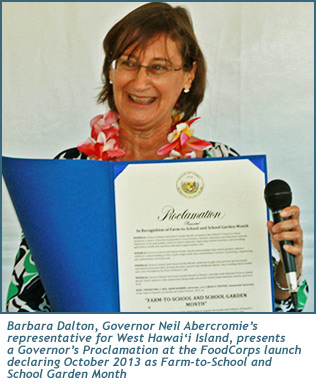 On September 20th, Amelia and the eight FoodCorps Hawai‘i service members were introduced at the FoodCorps Hawai‘i program launch held at Māla‘ai: The Culinary Garden of Waimea Middle School, one of the five FoodCorps service sites on Hawai‘i Island. The launch event also featured a presentation of the official Governor’s Proclamation of October 2013 as Farm-to-School and School Garden Month in Hawai‘i. Waimea Middle School Principal Matt Horne, speaking at the event, noted that over 50% of his school’s population is of Native Hawaiian or Pacific Islander descent, and statistics indicate that one out of every two of these children “will end up with adult onset diabetes if we don’t do something. We have a moral imperative to act. We’re certainly trying to address that with the Māla‘ai garden by growing fresh, nutritious food right here on campus, and thanks to the Hawai‘i Island School Garden Network, and now FoodCorps, we will have a much greater chance of success—for our keiki and their families.”
On September 20th, Amelia and the eight FoodCorps Hawai‘i service members were introduced at the FoodCorps Hawai‘i program launch held at Māla‘ai: The Culinary Garden of Waimea Middle School, one of the five FoodCorps service sites on Hawai‘i Island. The launch event also featured a presentation of the official Governor’s Proclamation of October 2013 as Farm-to-School and School Garden Month in Hawai‘i. Waimea Middle School Principal Matt Horne, speaking at the event, noted that over 50% of his school’s population is of Native Hawaiian or Pacific Islander descent, and statistics indicate that one out of every two of these children “will end up with adult onset diabetes if we don’t do something. We have a moral imperative to act. We’re certainly trying to address that with the Māla‘ai garden by growing fresh, nutritious food right here on campus, and thanks to the Hawai‘i Island School Garden Network, and now FoodCorps, we will have a much greater chance of success—for our keiki and their families.”
2013-2014 FoodCorps Hawai‘i Community-Level Partners
- MA‘O Organic Farms, O‘ahu
- Sust‘ainable Molokai, Moloka‘i School Garden Network
- The Kohala Center, Hawai‘i Island School Garden Network, Host Site
2013-2014 FoodCorps Hawai‘i Service Members and Schools
- Tasia Yamamura, Wai‘anae Elementary School, O‘ahu
- Lacey Phifer, Moloka‘i High School, Moloka‘i
- Simon Mendes, Maunaloa Elementary School, Moloka‘i
- Janette Lee, Kohala Elementary School, North Kohala, Hawai‘i Island
- Jessica Sobocinski, Hōnaunau Elementary School, South Kona, Hawai‘i Island
- Jolyne Oyama, Nā‘ālehu Elementary School, Ka‘ū, Hawai‘i Island
- Leina‘ala Kealoha, Kua O Ka Lā Public Charter School, Puna, Hawai‘i Island
- Julia Nemoto, Māla‘ai: The Culinary Garden of Waimea Middle School
Puanani Burgess joins board of directors
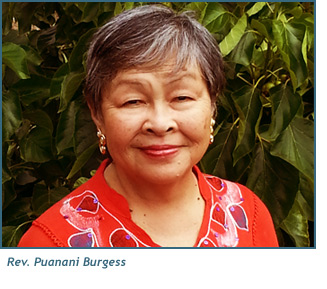 The Kohala Center recently welcomed Rev. Puanani Burgess of Wai‘anae, O‘ahu, to its board of directors. A mediator, poet, community organizer, cultural translator, and Zen priest, Burgess consults and does her work One-Peace-At-A-Time. She is noted for her experience in community, family and values-based economic development, mediation and storytelling processes as part of conflict transformation, and developing community-based organizations.
The Kohala Center recently welcomed Rev. Puanani Burgess of Wai‘anae, O‘ahu, to its board of directors. A mediator, poet, community organizer, cultural translator, and Zen priest, Burgess consults and does her work One-Peace-At-A-Time. She is noted for her experience in community, family and values-based economic development, mediation and storytelling processes as part of conflict transformation, and developing community-based organizations.
As part of her Hawai‘i-based work, Burgess helped develop several community-based organizations including Ka‘ala Farm, Inc. (taro and ‘āina-based cultural learning center in Wai‘anae); Hoa ‘Aina O Makaha (‘āina-based cultural and agricultural learning center in Mākaha); Hale Na‘au Pono (Wai‘anae Coast Community Mental Health Center); Puʻa Foundation (the only Native Hawaiian foundation in Hawai‘i); Legal Services for Children (focusing on assuring children in Wai‘anae receive free and appropriate educational services); and Wai‘anae Coast Community Alternative Development Corporation (developed community and cultural-based aquaculture program with Native Hawaiian families).
“We are honored to have Rev. Burgess join our board,” said Roberta Chu, president of The Kohala Center’s board of directors and senior vice president for commercial banking with Bank of Hawaii. “She is extraordinarily gifted—a poet, a peacemaker, and an expert in values-based economic development. And she is a lovely person, whose counsel is sought after around the world because of her truly insightful and gracious way of being.”
Her work takes her all over the United States, the Pacific, and other parts of the world. Burgess says that it is fostering the connection—with self, with place, with community—that is the key to her success in bringing people together.
Burgess was among five people named as Hawai‘i’s Living Treasures in 2009. In September of this year, Burgess was recognized by the Pacific Buddhist Academy as a 2013 Lighting Our Way Honoree, citing her ability to recognize the gifts of others—those traits that best represent us and the purposes we bring to the world—to “pierce through the walls” that separate individuals. She uses this ability to facilitate processes in creating and reshaping relationships between people.
She has been a lecturer with the Department of Urban and Regional Planning at the University of Hawai‘i, where she was the first “Community Scholar in Residence.” She sits on the Board of Directors for the Positive Futures Network, the publisher of YES! Magazine, and was the Miles and Zilphia Horton Chairholder for Highlander Research and Education Center in New Market, Tennessee.
“I am so looking forward to supporting and learning from The Kohala Center’s work and heart,” Burgess said.
Keiki Fishing Derby and Family Fun Day at Kahalu‘u Bay
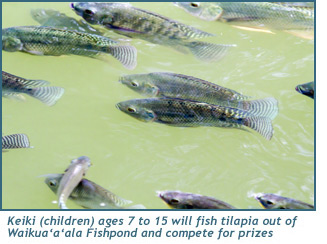 Kahalu‘u Bay Education Center (KBEC), a program of The Kohala Center, is holding its first-ever Keiki Fishing Derby for kids ages 7 to 15 at Waikua‘a‘ala Fishpond in Kahalu‘u Beach Park. This day of family fun will be held on Saturday, October 26th from 9 a.m. to 2 p.m. and will include Hawaiian games, music, coconut weaving demonstrations, face painting, and more.
Kahalu‘u Bay Education Center (KBEC), a program of The Kohala Center, is holding its first-ever Keiki Fishing Derby for kids ages 7 to 15 at Waikua‘a‘ala Fishpond in Kahalu‘u Beach Park. This day of family fun will be held on Saturday, October 26th from 9 a.m. to 2 p.m. and will include Hawaiian games, music, coconut weaving demonstrations, face painting, and more.
Registration and complete information are available online at KeikiFishingDerby.org or at the KBEC tent at Kahalu‘u Beach Park. The event is free, with a suggested donation of $10 to register for the fishing derby. All proceeds will help Kahalu‘u Bay Education Center keep Kahalu‘u Bay a healthy and happy place.
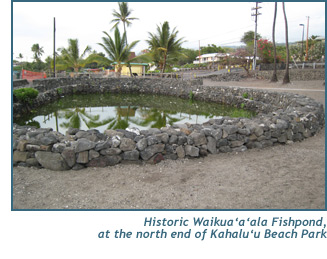 On the north end of Kahalu‘u Beach Park sits historic Waikua‘a‘ala Pond, once a royal bath for Hawaiian ali‘i (chiefs). Lovingly restored by community members and ReefTeach volunteers after the 2011 tsunami, the pond is filled with invasive tilapia. No one’s quite sure how the tilapia got there, but they are unwelcome occupiers.
On the north end of Kahalu‘u Beach Park sits historic Waikua‘a‘ala Pond, once a royal bath for Hawaiian ali‘i (chiefs). Lovingly restored by community members and ReefTeach volunteers after the 2011 tsunami, the pond is filled with invasive tilapia. No one’s quite sure how the tilapia got there, but they are unwelcome occupiers.
KBEC program director Cindi Punihaole came up with the idea for a fishing derby for kids as a way to reduce the number of tilapia in the pond. The concept blossomed into a bigger family fun day, at which kids could compete for prizes while learning about environmental stewardship, and families could enjoy a variety of activities engaging Hawaiian culture and reconnecting them to the area’s history.
“Even though the tilapia are invasive, it’s still important to take care of them in a responsible way,” Cindi says. All the tilapia caught will go to Kona Aquaponics, which will raise them for food and use their waste to fertilize the aquaponic farm. Daniel Kauth of Kona Aquaponics said he is building a new grow bed just for the fish caught at the derby.
“When Cindi called to ask if we would take the tilapia for our farm, we knew it was a win-win situation,” said Kauth. “I believe in helping Kahalu‘u Bay. It’s a beautiful and important community gathering place, and KBEC’s efforts to protect the bay and bring the park back to its ‘glory days’ are admirable. We’re pleased to be a part of this event, and put the tilapia to good use for the benefit of others.”
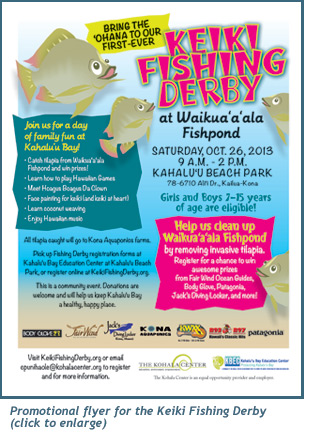 Fishing Derby participants will compete in two age divisions, with kids ages 7-10 competing at 10 a.m. and ages 11-15 at 11 a.m. Judges will award prizes to boys and girls in each division in three categories: Most Fish Caught, Biggest Fish Caught, and Best Homemade Fishing Pole.
Fishing Derby participants will compete in two age divisions, with kids ages 7-10 competing at 10 a.m. and ages 11-15 at 11 a.m. Judges will award prizes to boys and girls in each division in three categories: Most Fish Caught, Biggest Fish Caught, and Best Homemade Fishing Pole.
Prizes include merchandise and gift certificates from event sponsors Fair Wind Ocean Guides, Jack’s Diving Locker, Body Glove, Patagonia, and Kona Aquaponics. KWXX-FM, B93 & B97 FM, KTA Superstores, and Starbucks are also event sponsors.
Children competing in the Keiki Fishing Derby must bring their own fishing poles with a bamboo rod, fishing line, and a size 14 barbless hook. Instructions on how to construct a fishing pole may be found at http://bit.ly/16mCLBu. Participants are encouraged to be creative and decorate their fishing poles. Bait will be provided. Everything needed to create a fishing pole may be purchased at Pacific Rim Fishing Supplies in Kona, S. Tokunaga Store in Hilo, and other island fishing stores. A limited amount of poles will be available for sale at the event.
Other activities planned for the day include lauhala and coconut frond weaving with Auntie Mele Waikīkī, Hawaiian games (konane, pala‘ie, and hei), face painting, a visit by Hoagus Boagus Da Clown, and Hawaiian music entertainment.
It’s in the water: Maui Aquaponics Worker Cooperative
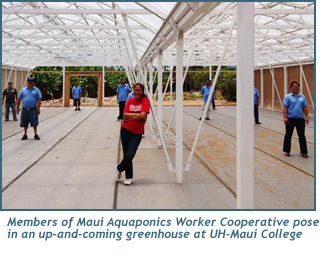 Continuing its track record of assisting emerging cooperative businesses in Hawai‘i, the Laulima Center for Rural and Cooperative Business Development has been working with a unique group on Maui: The Maui Aquaponics Workers Cooperative (MAWC). The cooperative was formed by a group of aquaponics technicians with disabilities who had a vision of owning their own sustainable agriculture business, providing them with job security and Maui markets with fresh, locally produced food.
Continuing its track record of assisting emerging cooperative businesses in Hawai‘i, the Laulima Center for Rural and Cooperative Business Development has been working with a unique group on Maui: The Maui Aquaponics Workers Cooperative (MAWC). The cooperative was formed by a group of aquaponics technicians with disabilities who had a vision of owning their own sustainable agriculture business, providing them with job security and Maui markets with fresh, locally produced food.
Having finished an in-depth, commercial aquaponics training program at the College of Education, Center on Disability Studies at the University of Hawai‘i-Maui College, the program graduates chose a worker cooperative business model, giving all members ownership in the company. The worker-owners operate the UH-owned greenhouse, and will market the vegetables and fish they raise to local markets on Maui. As distributors for Nelson and Pade Inc., MAWC will also sell small, home, backyard, and commercial-scale aquaponics systems, and offer technical assistance to assemble them for customers.
For many of the co-op members, MAWC offers an empowering opportunity to own their own business, start up from scratch, and learn the technical skills of applied aquaponics science, business development, and marketing.
The Laulima Center, a program of The Kohala Center, played a role in the group’s cooperative education. Center staff assisted MAWC with incorporating as a cooperative business in the state of Hawai‘i and building its group process skills. Additionally, the Laulima Center provided business development consulting and grant writing services.
Simply put, aquaponics is a food production system in which produce is grown using water as media rather than soil, with the water recycled back through fish tanks. The only input into this recirculating green-food system is the fish food. Otherwise, fast-growing vegetables and edible fish, such as tilapia, are produced in several months, growing in two-thirds the time of traditional soil farming.
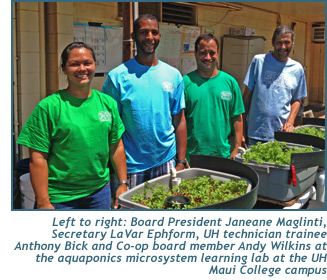 Worker cooperatives make decisions collectively, and this co-op has chosen to use the sociocracy method popularized by John Buck in his book We the People, taught locally by John Schinnerer. Better decisions are made when everyone is heard and considered, and better elections occur when the best people for positions are identified.
Worker cooperatives make decisions collectively, and this co-op has chosen to use the sociocracy method popularized by John Buck in his book We the People, taught locally by John Schinnerer. Better decisions are made when everyone is heard and considered, and better elections occur when the best people for positions are identified.
Canada has a growing number of worker cooperatives developed by individuals with disabilities, who seek the security of owning their own business, sharing in the equity and profits, and the confidence that results with co-workers who understand the “ups and downs” of living with disabilities. Center on Disability Studies faculty member Susan Miller, whose expertise includes business and workforce development training for youth and adults with disabilities, is the co-op’s principal investigator and project director.
Susan was a founding member of Kōkua Food Cooperative in Honolulu, which required a change in the law to allow for the establishment of consumer cooperatives in Hawai‘i. Project assistant Christina Lizzi, who has a keen interest in sustainable local solutions to aquaculture, supports the group as they develop their cooperative business.
As one of the co-op’s founding members, Janeane Maglinti saw the potential for an aquaponics worker cooperative to enable people with disabilities to work steadily, gain financial security, and live productive lives in the community. “Aquaponics is one answer to feeding the world,” she says. “From what I’ve learned about the system, I find it to be sustainable in every way. Doing aquaponics makes me happy, and the cooperative business model gives people with disabilities a chance they might not otherwise have.
They may get ill or have a crisis. The cooperative gives us the flexibility to accommodate everyone.”
“I’m in the cooperative to be my own boss,” says Andy Wilkins, MAWC founding member.
Gary N. Nip, board vice president and founding member of MAWC, says he’s excited about the opportunity. “Aquaponics is the best thing and most wonderful thing that has happened to me in a very long time.”
Advancing Hawai‘i's organic food industry
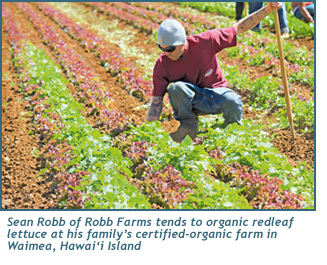 The lack of institutional support services in recent years for Hawai‘i’s organic farmers, producers, distributors, and retailers impacts their competitive advantage in several areas, including research and development, production, processing, and marketing. “Growing Organics: Moving Hawai‘i’s Organic Industry Forward” is a one-day conference featuring presentations, workshops, and opportunities for the public to provide input on how to strengthen Hawai‘i’s organic foods industry. The event will be held on Monday, October 28, 2013 in Kailua-Kona.
The lack of institutional support services in recent years for Hawai‘i’s organic farmers, producers, distributors, and retailers impacts their competitive advantage in several areas, including research and development, production, processing, and marketing. “Growing Organics: Moving Hawai‘i’s Organic Industry Forward” is a one-day conference featuring presentations, workshops, and opportunities for the public to provide input on how to strengthen Hawai‘i’s organic foods industry. The event will be held on Monday, October 28, 2013 in Kailua-Kona.
The “Growing Organics” conference is part of a one-year study being conducted by The Kohala Center on behalf of the Hawai‘i Department of Agriculture (HDOA) to determine what barriers Hawai‘i’s organic food producers, distributors, retailers, and consumers face, and recommend solutions to improve certification processes, local production, distribution, marketing, and advocacy. The Kohala Center convened an statewide Organic Industry Advisory Group in February 2013 to identify the local organic industry’s challenges, develop a public survey to collect data, and craft recommendations to present to HDOA.
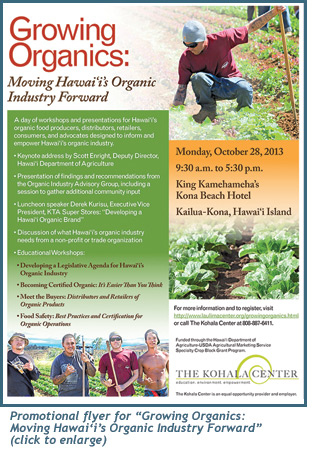 Scott Enright, Deputy Director of the Hawai‘i Department of Agriculture, will deliver a keynote address at the start of the conference. The Organic Industry Advisory Group will then present its preliminary recommendations and encourage input from event attendees in order to refine the recommendations.
Scott Enright, Deputy Director of the Hawai‘i Department of Agriculture, will deliver a keynote address at the start of the conference. The Organic Industry Advisory Group will then present its preliminary recommendations and encourage input from event attendees in order to refine the recommendations.
Derek Kurisu, executive vice president of KTA Superstores, is the featured speaker at the event’s luncheon. Following the luncheon, a series of workshops will be conducted, covering topics such as organic certification, food safety, developing a legislative agenda for Hawai‘i’s organic industry, and defining the roles and responsibilities of an independent industry association. One session will feature produce and product buyers from Hawai‘i retailers, providing attendees an opportunity to network with local buyers and distributors to learn more about their requirements.
Both the keynote address and the advisory group’s presentation are free and open to the public, although advance registration online is requested. Admission to the luncheon is $30 per person, and admission to the workshops is $20 per person. Attendees can register for both the luncheon and workshops for $45.
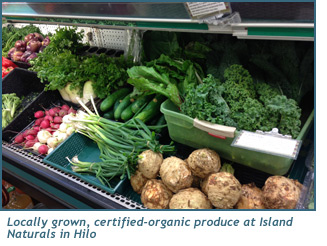 “This initiative came about as a result of the fact that Hawai‘i’s organic food producers no longer had a central place where they could obtain information on critical issues such as infrastructure, processing, marketing, certification, and business development,”said Melanie Bondera, Rural Cooperative Development Specialist for the Laulima Center, a program of The Kohala Center. “Through the Organic Industry Advisory Group and public input, we are determining how existing entities can support organics in Hawai‘i, whether a centralized educational and advocacy organization should be re-established, and how the local industry can overcome the barriers that are affecting farming operations, production, distribution, quality, and costs.”
“This initiative came about as a result of the fact that Hawai‘i’s organic food producers no longer had a central place where they could obtain information on critical issues such as infrastructure, processing, marketing, certification, and business development,”said Melanie Bondera, Rural Cooperative Development Specialist for the Laulima Center, a program of The Kohala Center. “Through the Organic Industry Advisory Group and public input, we are determining how existing entities can support organics in Hawai‘i, whether a centralized educational and advocacy organization should be re-established, and how the local industry can overcome the barriers that are affecting farming operations, production, distribution, quality, and costs.”
More information and registration are available online at http://www.laulimacenter.org/growingorganics.html, or by calling The Kohala Center at (808) 887-6411. The Kohala Center will release its final project report, including recommendations to HDOA, in early 2014.


